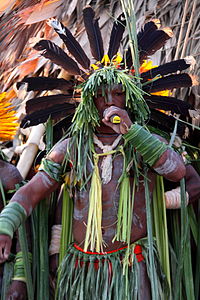Enawene Nawe
- Machine translation, like DeepL or Google Translate, is a useful starting point for translations, but translators must revise errors as necessary and confirm that the translation is accurate, rather than simply copy-pasting machine-translated text into the English Wikipedia.
- Do not translate text that appears unreliable or low-quality. If possible, verify the text with references provided in the foreign-language article.
- You must provide copyright attribution in the edit summary accompanying your translation by providing an interlanguage link to the source of your translation. A model attribution edit summary is
Content in this edit is translated from the existing Portuguese Wikipedia article at [[:pt:Enauenê-nauês]]; see its history for attribution. - You may also add the template
{{Translated|pt|Enauenê-nauês}}to the talk page. - For more guidance, see Wikipedia:Translation.
 Enawene Nawe man from Mato Grosso | |
| Total population | |
|---|---|
| 737 (2014)[1] | |
| Regions with significant populations | |
 Brazil ( Brazil ( Mato Grosso) Mato Grosso) | |
| Languages | |
| Enawené-Nawé[2] | |
| Religion | |
| Traditional tribal religion[1] |
The Enawenê-Nawê are an indigenous people of Brazil in the Mato Grosso state. They live in a large village near the Iquê River in the Enawenê Nawê Indigenous Land.[1] They practice agriculture, fishing, and gathering and do not hunt or eat red meat.
The Enawene Nawe are a relatively isolated people who were first contacted in 1974 by Vicente Cañas. They numbered 566 in 2012,[1] up from 320 in 2000. In 2014 their number grew to 737.[2]
Name
The Enawené-Nawé are also known as the Enawenê-nawê,[1] Eneuene-Mare or Salumã people. They are distinct from the Salumá people in Pará.[2]
Language
The Enawené-Nawé language is a Central Maipuran language, part of the Arawakan language family.[2]
Current issues
These people are endangered by corporations that encroach on their land and pollute the rivers from which they obtain their source of food. Many dams have been built or are under construction on the Juruena river that pollute the water and kill many of the fish. Without fish, there is no food for the Enawene Nawe people, as they eat no red meat. Many people believe it is Blairo Maggi, a politician and corporation executive, who wants these dams.[3] He has plans to build 77 dams on the river. Constitutionally, Brazil's tribes are supposed to receive full protection from the federal government, but like its predecessors, the current government has frequently ceded to pressure from Brazilian and international agribusiness. The people rely on support from NGOs like Survival International. Also, they believe the nearby land is home to many important spirits, but the land is being destroyed by ranchers, who continue to build dams and who have threatened violence if the members of the tribe perform their rites, such as Yaokwa, their ritual for the maintenance of social and cosmic order.[4]
Notes
- ^ a b c d e "Enawenê-nawê: Introduction." Instituto Socioambiental: Povos Indígenas no Brasil. Retrieved 28 March 2012
- ^ a b c d "Enawené-Nawé." Ethnologue. 2009. Retrieved 28 March 2012.
- ^ "Enawene Nawe: Dams". Survival International. Retrieved 25 November 2016.
- ^ "Yaokwa, the Enawene Nawe people's ritual for the maintenance of social and cosmic order". UNESCO Culture Sector. Retrieved 2014-08-06.
External links
- Survival International Enawene Nawe page
- v
- t
- e
 Indigenous peoples of Brazil
Indigenous peoples of BrazilIndigenous peoples of the North Region | |||||||||||||||
|---|---|---|---|---|---|---|---|---|---|---|---|---|---|---|---|
| |||||||||||||||
Indigenous peoples of the Northeast Region | |||||||||||
|---|---|---|---|---|---|---|---|---|---|---|---|
| |||||||||||
Indigenous peoples of the Central-West Region | |||||||
|---|---|---|---|---|---|---|---|
| |||||||
Indigenous peoples of the South and Southeast Regions | |||||||||||
|---|---|---|---|---|---|---|---|---|---|---|---|
| |||||||||||













